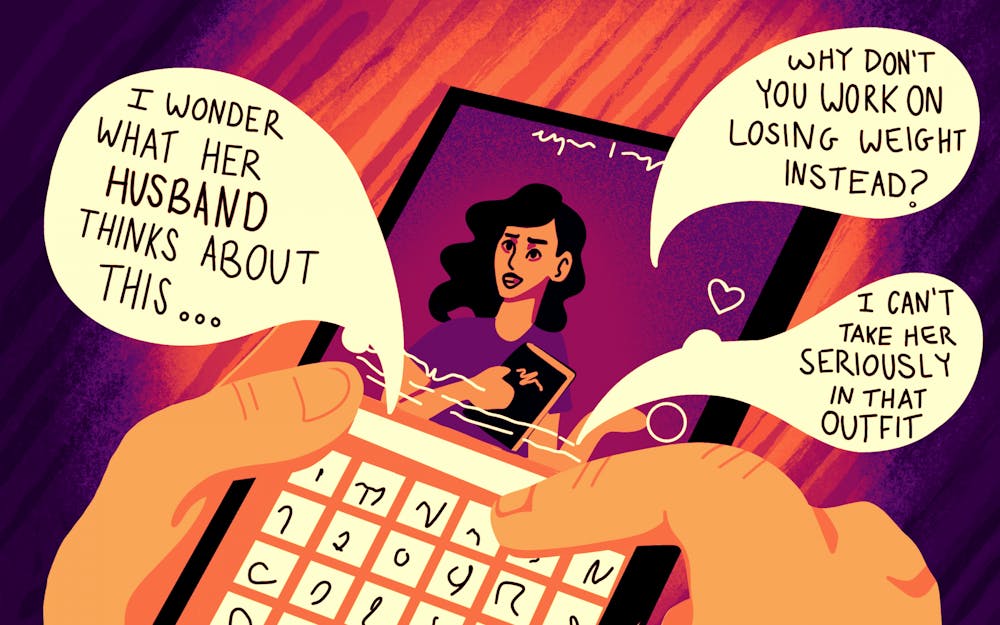It is all too common these days to see celebrity feuds, and women are often at the center of them. The impossible standards women hold for other women are a product of the patriarchy— and this is especially apparent in the parasocial relationships many TikTok users have with public figures.
Parasocial relationships are defined as one-sided relationships, usually directed toward celebrities, in which the object of a person’s time, effort and interest is unaware of their existence. The most recent instance I’ve noticed is the alleged conflict between Hailey Bieber and Selena Gomez and the input so many social media users seem to have on it.
For those who don’t even know those names, Hailey Bieber is a model and founder of Rhode, a skincare company. She is also married to singer Justin Bieber as of 2018. Selena Gomez is a singer and actress, as well as founder of the makeup company Rare Beauty. She was in an off-and-on relationship with Justin Bieber until 2018.
[Related: COLUMN: On the clock: Unpacking the birth control hysteria]
Some Gomez fans and supporters have been criticizing and bullying Hailey Bieber since she was first rumored to be dating Justin, but there has been a recent uptick in negative content directed toward her on TikTok, following a social media post from Kylie Jenner and Bieber. The post was interpreted by many as being serious and indicative of conflict with Gomez, but I think people’s reaction displays disturbingly petty and parasocial obsession to the point that the “drama” is not worth explaining. People are likely so heavily invested in the cultivation of this drama because they have fascinations and attachments to these celebrities who do not know them.
Despite the public denial of conflict from both Gomez and Jenner, Hailey Bieber has not been spared from an influx of bullying and criticism coming in the form of negative comments concerning her appearance, the validity of her popularity and personal brand, her relationship with Justin Bieber and allegations of jealousy of Gomez. Many videos of this nature have hundreds of thousands of likes.
I do not care whether Hailey Bieber is jealous of or obsessed with Gomez. I do not care if Justin Bieber cheated on Gomez with Hailey Bieber. I do not care if Hailey Bieber does not “deserve” her success or following. No common internet user who is not directly in contact with Bieber herself understands any of these situations, and they should not want to.
The way that so many people — mainly other women — are aggressively bullying Bieber demonstrates just how far we have to go in the way we view and treat women. Nearly all of the creators and users who are casting criticism toward Bieber have no personal relation to any of the people involved in this perceived drama.
The criticism Bieber faces alarms me about the way women continue to treat other women by belittling superficial things — such as their appearance — and attaching their worth to their relationships to men. Celebrities do not require TikTok users’ defense, criticism or input on their interpersonal relationships.
[Related: COLUMN: On the clock: What's up with wellness?]
This Hailey Bieber situation is by no means novel or isolated. I saw this with people pitting Kate Middleton and Meghan Markle against each other anytime the British royal family was trending — who is more classy, whose husband loves them more, who is “worthy” of marrying into the family. Or take the hatred and bullying directed at Camilla, King Charles’ current wife and previous partner in an affair during his marriage to Princess Diana.
The simple takeaway from the vast majority of the criticism facing these women on TikTok is that it is misogynistic and baseless. Camilla is not a bad or unworthy partner because she is old and perceived by many as being less attractive than Diana. The reason Diana did not “deserve” to be cheated on should have nothing to do with her youthfulness or perceived attractiveness. Women can be held accountable and validly criticized independently from their appearances and attachment to male figures.
This misogynistic treatment toward women predates social media — but the vast amount of media that is now available to consume and our ability to hide behind a screen certainly exacerbates it. As women, we must work to defend and protect the safety and respect of other women. An easy way to do so is by refusing to engage in blatantly hateful and misogynistic bullying of women in the public eye. Help make your female peers feel safe, secure and respected in our patriarchal society — Hailey Bieber may not see your comments, but your female friends and family will.
Leila Faraday (she/her) is a freshman studying policy analysis.






